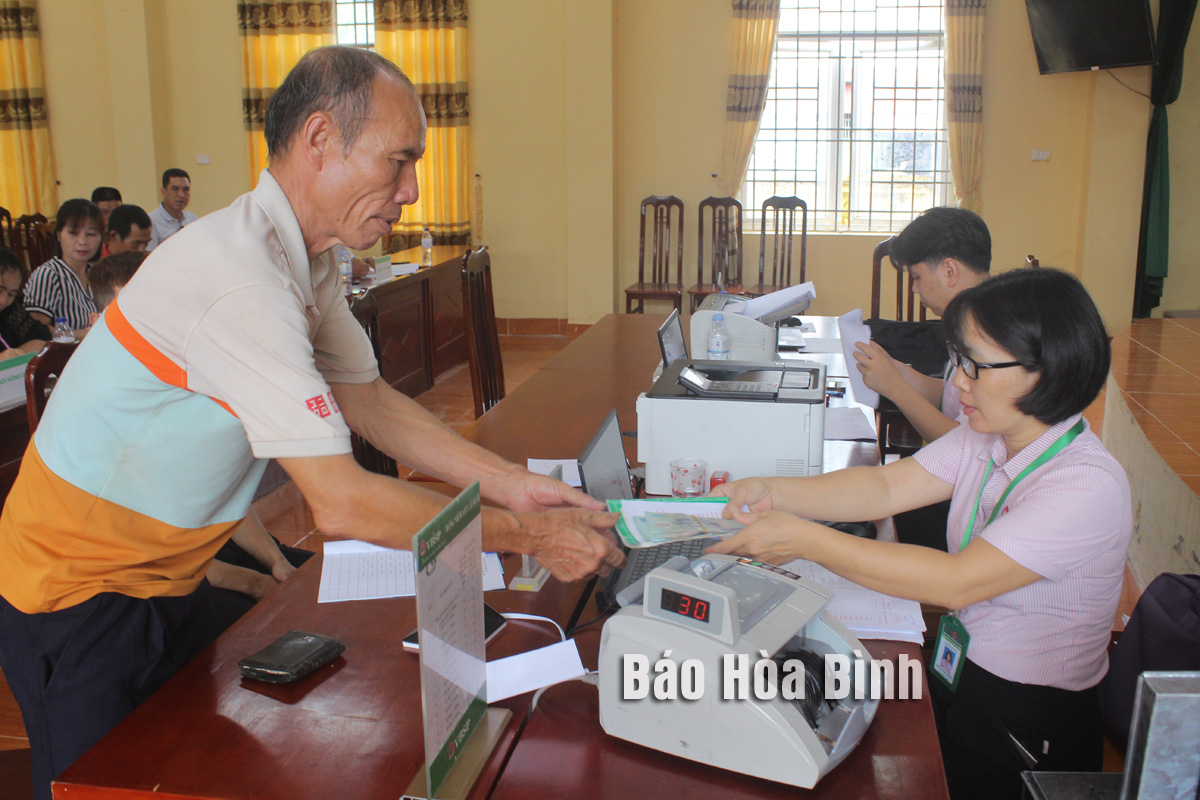
Accessing preferential loans from the Vietnam Bank for Social Policies (VBSP), many households in Tan Lac district have escaped poverty and many students progressed on their quest for knowledge.

Bui Van Nam from Chua hamlet, Tu Ne commune, Tan Lac district,
completes repayment of a student loan to the VBSP after both his sons graduated
from university and secured stable jobs.
One day in June, Bui Van Nam – a resident in Chua hamlet, Tu
Ne commune, Tan Lac district – visited the commune's transaction point to
settle a student loan from the VBSP. Years ago, his family decided to borrow
policy funds to invest in their children's university education. The investment
has yielded fruit, with their sons now working in the educational and medical
fields.
Nam shared that the family had many difficulties, so
deciding to send the boys to university put them under significant pressure.
With so many expenses to cover, without the State's preferential capital
support it could be extremely hard for them to do so and reap the fruits of
today. "My family is deeply grateful for the Party’s and State's policy
funding, which enabled our disadvantaged children to pursue education.”
Meanwhile, Ha Van Nhuong's family in Man Duc town’s Hong
Duong residential area also reaped fruitful results thanks to the policy
credit. With a loan of 50 million VND (2,000 USD) from the bank, their economic
situation has steadily improved. Through grapefruit cultivation and livestock
farming, they now earn over 150 million VND on an annual basis.
Currently, 15 policy credit programmes are being implemented
in Tan Lac district, with a debt balance from over 15,600 households totaling
575.4 billion VND. In the first half of 2024 alone, the local trade office of
the VBSP disbursed over 105.7 billion VND to poor households and other policy
beneficiaries, hence the creation of more than 300 jobs as well as the construction
of 675 clean water and 648 household sanitation facilities.
Director of the office Nguyen Tuan Ngoc said local residents
still have high demand for policy loans. In recent years, to supplement funds
for preferential credit programmes, in addition to annual allocations from
higher-level banks, the branch has advised authorities of the district to
allocate a portion of the local budget to the VBSP’s operation here. "We have
also actively mobilised idle funds within the community," Ngoc added.
Dao Village’s honey – a product certified with a 3-star OCOP (One Commune One Product) rating by Thong Nhat Agricultural Cooperative in Dao Village (Hoa Binh City) – is highly regarded by consumers for its quality, richness, and variety in packaging. The distinctively sweet taste of Dao Village’s honey leaves a lasting impression on anyone who has tried it.
In alignment with Project No. 07-DA/TU, issued by the Hoa Binh provincial Party Committee on November 1, 2021, Lac Thuy district has actively promoted investment and supported the sustainable development of its industrial and handicraft sectors during the 2021–2025 period. Alongside this, the district has remained committed to preserving and revitalising traditional craft villages.
Located in the northern part of Lac Thuy district, with a temperate climate and fertile soil, Phu Thanh commune has great potential and advantages in growing tea. The long-standing experience, combined with strict adherence to organic farming practices in the tea gardens, ensures that the dried tea products from Phu Thanh and Lac Thuy as a whole are sold out immediately upon production, providing a stable and prosperous life for the local people.
Amid efforts to streamline the administrative apparatus, Hoa Binh province has intensified measures to address challenges in land clearance, resettlement support, and infrastructure investment, aiming to speed up the progress of key projects.
Hoa Binh province has posted an unprecedented economic growth rate of 12.76% in the first quarter of 2025, marking its highest quarterly performance to date and positioning it as the second fastest-growing locality in the country, trailing only Bac Giang province.
Under current regulations, products in the One Commune – One Product (OCOP) programme that are rated three stars or higher must undergo re-evaluation every three months. However, in reality, some of these products fail to consistently meet the required standards, raising concerns about the sustainability of their OCOP certification. This underscores the urgent need for producers to enhance product quality and gradually develop their OCOP products into strong, marketable brands.



